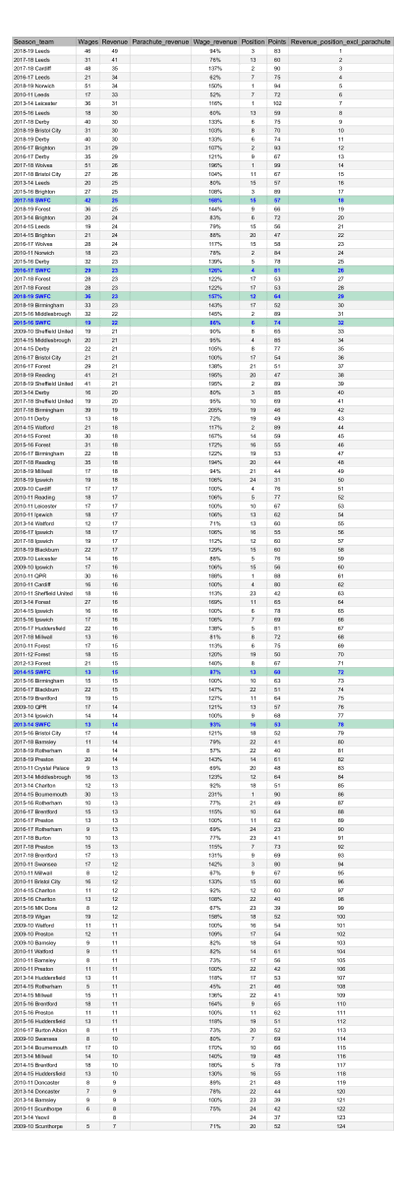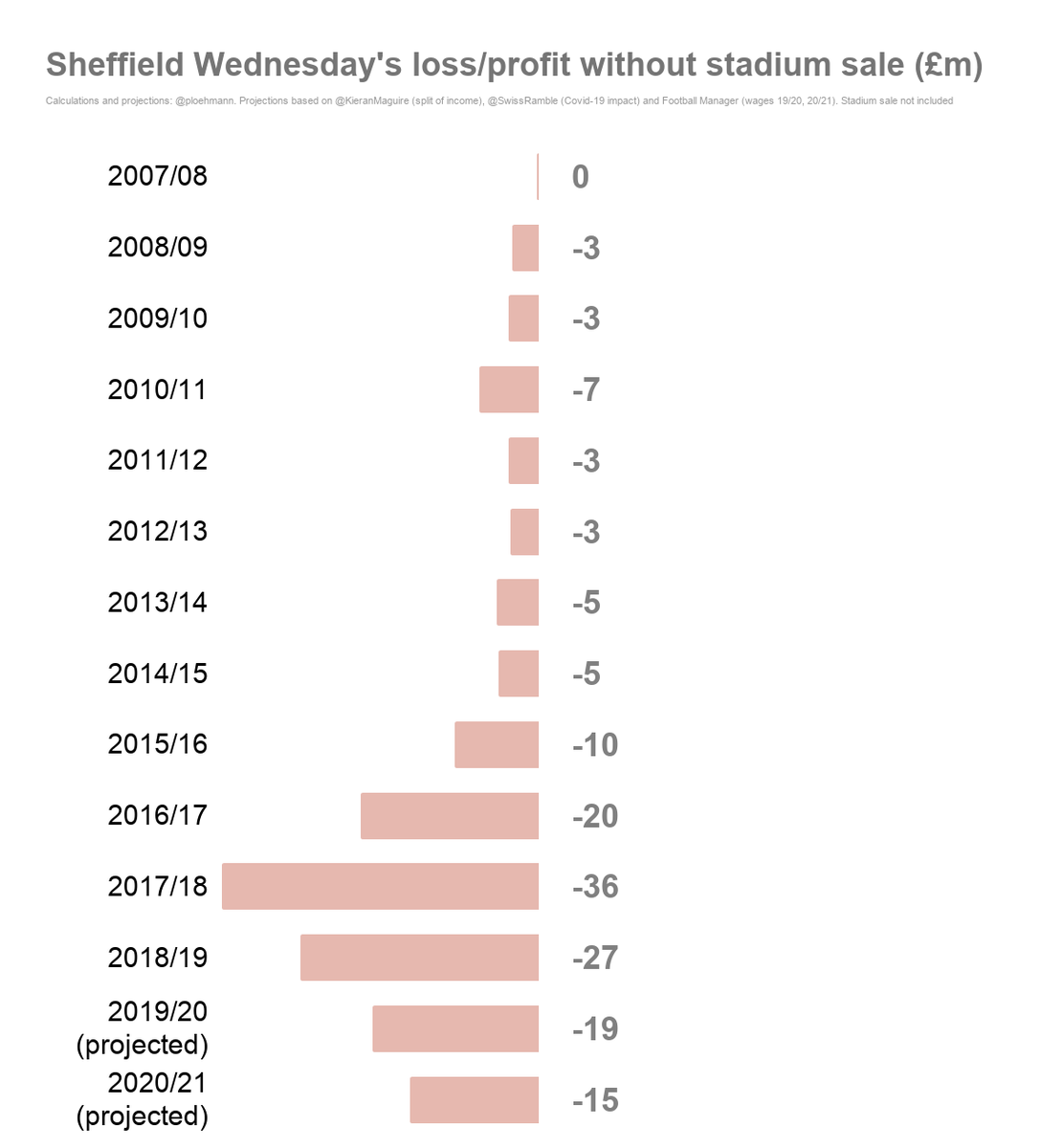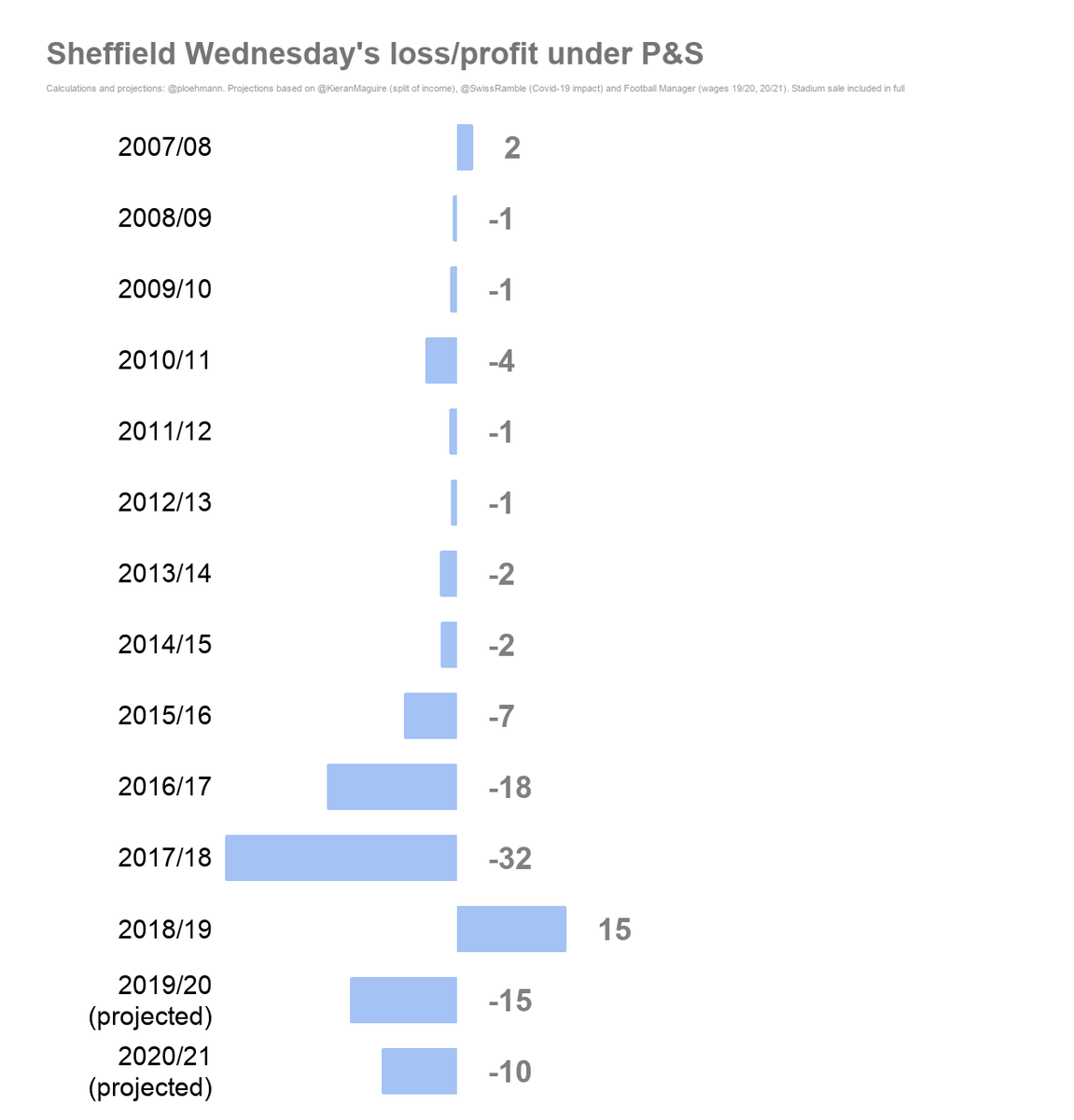
#swfc An attempt to make sense of our 2018/19 accounts, and football finance, in the far too long (sorry!) "read along" thread below.
tl;dr: Still in the purgatory of unsustainable spending and viable only for as long as Chansiri keeps underwriting £20m losses every year.
tl;dr: Still in the purgatory of unsustainable spending and viable only for as long as Chansiri keeps underwriting £20m losses every year.

First things first: I'm just a dude in Denmark with a spreadsheet. There's no magic In The Know knowledge or other such things in what I do and have done. It's all based on publicly available sources of information treated to a bit of thinking.
How hard is it then to predict what the accounts will look like based on those public sources of information?
I've made projections repeatedly on Twitter over the last couple of years and perhaps summed up best in this blog post for @SWFCTrust:
swfctrust.co.uk/blog/wednesday…
I've made projections repeatedly on Twitter over the last couple of years and perhaps summed up best in this blog post for @SWFCTrust:
swfctrust.co.uk/blog/wednesday…
How did those projections for 2018/19 look compared to the actual numbers in the accounts then? It turns out they weren't exactly wide off the mark: 

The main difference is due to the timing of transfer fees as well as the mysterious confidential settlement, which may not be related to Bruce's "transfer" to Newcastle. The figure quoted in public for Bruce's departure is more like the sum received in transfer fees (£2.8m).
The accounts end on 31 July 2019, so you'd assume the transfer income of £2.8m in the 2018/19 accounts can't be related to Lucas João's transfer to Reading as that only happened a month later:
transfermarkt.co.uk/sheffield-wedn…
transfermarkt.co.uk/sheffield-wedn…
But other than that nugget it turns out, with a bit of thinking, numbering and spreadsheeting, it was actually possible to predict the 2018/19 accounts.
More importantly, though:
What does it all mean?
More importantly, though:
What does it all mean?
At the very base level the accounts show us how Sheffield Wednesday Football Club Limited (…te.company-information.service.gov.uk/company/025099…) is operating.
The club earns money and it uses money, just like the rest of us. Where we mostly earn money from selling our time, the club gets its money from three main sources:
Match day
Broadcast
Commercial
Match day
Broadcast
Commercial
Match day is all sales of tickets.
Broadcast is our share of broadcast rights sales by the EFL, but mainly a "solidarity payment" from the EPL of 0.3% (£4.5m) of the EPL's total proceeds (£1.7b a year) from the sale of domestic broadcast rights
(resources.premierleague.com/premierleague/…).
Broadcast is our share of broadcast rights sales by the EFL, but mainly a "solidarity payment" from the EPL of 0.3% (£4.5m) of the EPL's total proceeds (£1.7b a year) from the sale of domestic broadcast rights
(resources.premierleague.com/premierleague/…).
Commercial is everything else: Catering sales (which are match day related), sponsorship, merchandise sales, youth development grants etc.
How does our revenue look through the years then?
How does our revenue look through the years then?

Broadcast revenue is more and more important. All revenue streams have grown, though, and are up by 50% compared to before Chansiri bought the club: 

The increase in revenue has been dwarfed by the increase in expenses, though, and under Chansiri the club spend £2 for every £1 it earns, because of more than £200m spent on players' wages and transfer fees: 

This is what Alan Sugar has called "the prune juice effect": All new revenue in the club comes out of it again as expenses, mainly on players, because clubs generally seem to believe is the way to be more successful than other clubs.
There's little to suggest that spending more than other clubs means more success on the pitch, though, as the difference in wage expenditure only explains around 20% of the variation in points won in the Championship since 2009: 



Looking at the clubs promoted from the Championship it's far from those spending the most on wages that manage to go up:
Six of the 15 clubs listed below spent less than half of the wages by the division's biggest spenders that season.
Six of the 15 clubs listed below spent less than half of the wages by the division's biggest spenders that season.

It's actually the same in the EPL, although the bottom three wage spenders in the EPL do tend to get relegated about half of the time, but outside the "Big Six" cartel there's no indication more spending means more points won: 





Birmingham in 2017/18 still hold the record for spending most beyond their revenue on wages - 205% - but Wednesday under Chansiri do crack the top 30 three times, in 8th, 12th and 30th, with 168%, 157% and 126% spent on wages of revenue respectively:
(promoted teams excluded)
(promoted teams excluded)

Wednesday's general revenue of £20m-£25m is significantly lower than Leeds' (£40m+) and lower than Cardiff, Norwich, Leicester, Derby, Bristol City and Brighton (£30m-£35m), so rather than big fish in a small pond we're more reef shark among other reef sharks. 





That's even excluding the clubs rewarded for relegation from the EPL with parachute payments, the sum of which makes up nearly £900m of the £3bn revenue (29%) in the Championship from 2014 to 2019.
As a rule of thumb 80% of wages are spent on first team players, so in the 14 months covered by the 2017-18 accounts we spent £42m on the squad, or £100,000 on average every single day 1 June 2017-31 July 2018.
The true cost of the Great Spendathon of 2017 is still being borne out now, though, despite a wage bill now projected as halved from its peak, with some of the big earners still around and the amortisation of Rhodes' club record transfer fee still ongoing: 



While we may not be the division's elite in earning money, we're doing very well in losing money.
Plenty of cost-cutting from 2018 onwards has reduced the loss, but it was from a very high base, so even in this current season we're likely to lose £15m:
Plenty of cost-cutting from 2018 onwards has reduced the loss, but it was from a very high base, so even in this current season we're likely to lose £15m:

I'd estimate about half of that loss is due to loss of income because of the pandemic, worth £7.5m. Even in "normal times" we'd then still be looking at a ~£8m loss, despite paying some of the division's highest ticket prices and wage costs having been halved inside three years. 

Losing money as a matter of principle isn't risk free as our deduction of six points this season clearly demonstrates.
If we look into the crystal ball do more problems with the EFL's Profitability & Sustainability (P&S) lie in wait?
If we look into the crystal ball do more problems with the EFL's Profitability & Sustainability (P&S) lie in wait?
Just to recap: P&S punishes losses of more than £39m over the last three seasons, which we fell foul of for the period including the seasons 2015-16, 2016-17 and 2017-18 as it was spelled out here in the verdict on our points deduction (efl.com/siteassets/ima…): 

Chansiri sale of Hillsborough to his shell company Sheffield 3 Ltd was allowed under EFL rules. The EFL charge and points deduction was a result of doing it too late for it to be included in the 2017/18 accounts, though.
We now know the stadium sale is in the 2018/19 accounts for P&S purposes too, which means we are very far from breaching the limit of combined losses of £39m over three seasons (which have been suspended for the 2019/20 season anyway): 





So it's definitely not because of the EFL's restrictions on spending that we have cut back costs and restricted transfer spending since 2017 though.
It's perhaps more relevant to look at Dejphon Chansiri's recent admission of cashflow issues (
It's perhaps more relevant to look at Dejphon Chansiri's recent admission of cashflow issues (
https://twitter.com/ploehmann/status/1347672994404069378?s=20):
The simplest solution to cashflow would be to issue new shares to fans, which would immediately bring in much needed cash without the need to sell off assets and in one fell swoop we as fans would be more involved (something I've banged on about before: docs.google.com/document/d/1Pn…).
Chansiri's total investment in Wednesday up to and including 31 July 2019 is up to £140m, which includes the first £7.5m installment of eight for Hillsborough. With a projected loss since then standing at £34m at season's end that would likely go up to £175m. 

It's interesting to note that Chansiri's net investment in and sponsorship of the club via other companies is down to £300k in 2018/19.
There's no indication of what the £800k in expenses consisted of:
There's no indication of what the £800k in expenses consisted of:

It's also interesting to see the transaction of Hillsborough away from Sheffield Wednesday Football Club Limited to Chansiri's shell company Sheffield 3 Ltd in more detail.
The lease is 30 years long, but with no payment in the first year:

The lease is 30 years long, but with no payment in the first year:


The yearly rent would be £1.625m a year for 2019/20 through 2022/23 and then £2.725m a year from 2023/24 through to the end of the lease in 2049.
That's significantly more than the £1.1m rent paid a year by Derby County after the £81.1m sale-and-lease-back of Pride Park:
That's significantly more than the £1.1m rent paid a year by Derby County after the £81.1m sale-and-lease-back of Pride Park:

@threadreaderapp unroll
• • •
Missing some Tweet in this thread? You can try to
force a refresh











